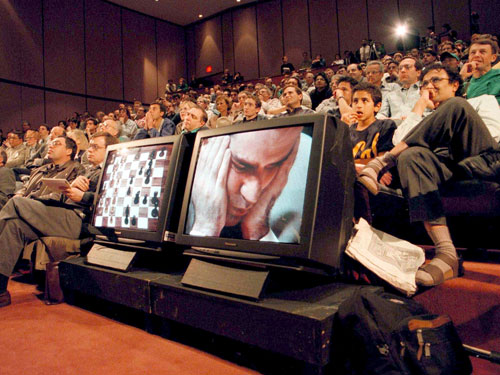Overall I enjoyed Garry Kasaprov’s Deep Thinking. Have philosophical disagreements with it, for sure, and there is some revisionism in regards to his personal history, but the author’s take on his career developing parallel to the rise of the machines and his waterloo versus IBM is fascinating. It’s clear that if there had been a different World Chess Champion during Kasparov’s reign, one who lacked his significant understanding of the meaning of computers and maverick mindset, the game would have been impoverished for it. I’ll try to make time this weekend to write a long review.
The 20-year retrospective on Deep Blue’s 1997 victory would be incomplete without reflection by Steven Levy, who penned the famous Newsweek cover story “The Brain’s Last Stand” as a preface to the titanic match in which humanity sunk. (It turns out Levy himself composed that perfectly provocative cover line that no EIC could refuse.)
The writer focuses in part on the psychological games that Deep Blue was programmed to play, an essential point to remember as computers are integrated into every aspect of life–when nearly every object becomes “smart.” Levy points out that no such manipulations were required for DeepMind to conquer Go, but those machinations might be revisited when states and corporations desire to nudge our behaviors.
An excerpt:
The turning point of the match came in Game Two. Kasparov had won the first game and was feeling pretty good. In the second, the match was close and hard fought. But on the 36th move, the computer did something that shook Kasparov to his bones. In a situation where virtually every top-level chess program would have attacked Kasparov’s exposed queen, Deep Blue made a much subtler and ultimately more effective move that shattered Kasparov’s image of what a computer was capable of doing. It seemed to Kasparov — and frankly, to a lot of observers as well — that Deep Blue had suddenly stopped playing like a computer (by resisting the catnip of the queen attack) and instead adopted a strategy that only the wisest human master might attempt. By underplaying Deep Blue’s capabilities to Kasparov, IBM had tricked the human into underestimating it. A few days later, he described it this way: “Suddenly [Deep Blue] played like a god for one moment.” From that moment Kasparov had no idea what — or who — he was playing against. In what he described as “a fatalistic depression,” he played on, and wound up resigning the game.
After Game Two, Kasparov was not only agitated by his loss but also suspicious at how the computer had made a move that was so…un-computer like. “It made me question everything,” he now writes. Getting the printouts that explained what the computer did — and proving that there was no human intervention — became an obsession for him. Before Game Five, in fact, he implied that he would not show up to play unless IBM submitted printouts, at least to a neutral party who could check that everything was kosher. IBM gave a small piece to a third party, but never shared the complete file.
Kasparov was not the same player after Game Two.•
“It was very easy, all the machines are only cables and bulbs.”
Tags: Garry Kasparov, Steven Levy

